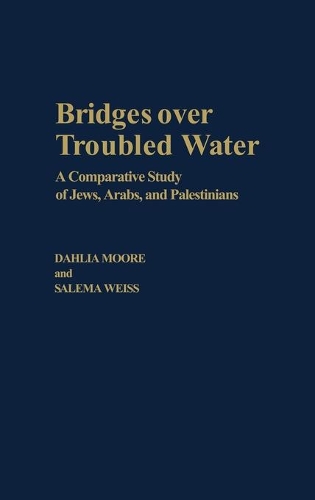
Bridges over Troubled Water: A Comparative Study of Jews, Arabs, and Palestinians
(Hardback)
Publishing Details
Bridges over Troubled Water: A Comparative Study of Jews, Arabs, and Palestinians
By (Author) Dahlia Moore
By (author) Salem Aweiss
Bloomsbury Publishing PLC
Praeger Publishers Inc
30th October 2004
United States
Classifications
General
Non Fiction
Warfare and defence
956.9404
Physical Properties
Hardback
248
Description
This work determines the processes that strengthen hostility between opposing groups and identifies those who are willing to act in order to change these situations. The backdrop of the Arab-Israeli conflict is used to demonstrate how collective identities are shaped by membership in ethnic and religious groups, and how these identities influence attitudes and behaviour. It examines political attitudes, hatred of "others," and willingness to assume responsibility for the various social issues of this conflict. This book takes a fresh approach to the Arab-Israeli conflict by relating it to three distinct societies: Jews, Arabs, and Palestinians. Though it deals with conflict, this assessment is optimistic in the sense that it shows that bridges can be built and maintained among these groups. These bridges are still small and fragile, but may be the structures upon which more elaborate relationships may be developed.
Reviews
[P]resents the results of two surveys that probe Jewish-Israeli, Arab-Israeli, and Palestinian identities....Many of the findings are highly relevant. For example, the authors provide evidence that Arabs are less extreme in their hatred of others than Jews and that religious Jews hate others more than do secular Jews and Arabs.-Journal of Palestine Studies
"Presents the results of two surveys that probe Jewish-Israeli, Arab-Israeli, and Palestinian identities....Many of the findings are highly relevant. For example, the authors provide evidence that Arabs are less extreme in their hatred of others than Jews and that religious Jews hate others more than do secular Jews and Arabs."-Journal of Palestine Studies
"[P]resents the results of two surveys that probe Jewish-Israeli, Arab-Israeli, and Palestinian identities....Many of the findings are highly relevant. For example, the authors provide evidence that Arabs are less extreme in their hatred of others than Jews and that religious Jews hate others more than do secular Jews and Arabs."-Journal of Palestine Studies
Author Bio
DAHLIA MOORE is Head of Graduate Studies in Organizational Consulting and Head of the Undergraduate Honors Program at the College of Management, Israel. SALEM AWEISS is Assistant Professor of Education and Psychology at Birzeit University and Visiting Professor at the University of Florida.
